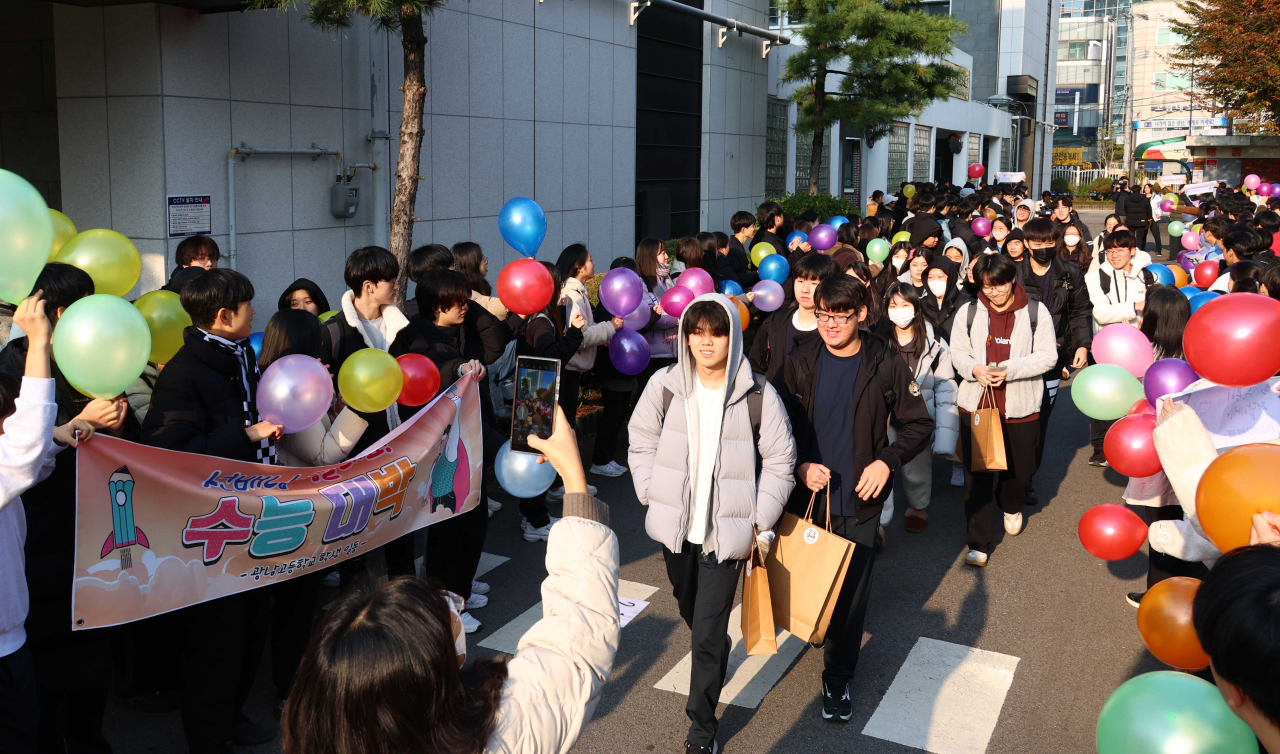 |
Teachers and students at Gwangnam High School in Gwangjin-gu, eastern Seoul, cheer for test takers on the eve of the Suneung, or the nation’s college entrance exam, Wednesday. (Joint Press Corps) |
The Suneung, South Korea’s national college entrance exam, has been administered on a Thursday every year since 2006.
The nationwide test, regarded as the most important exam Koreans take in their lifetimes, is held on the same weekday every year to secure the test distribution process, according to officials.
Transporting the examination papers to 84 cities, counties, and districts across the country takes three days. This process involves not only the travel time but also a cross-checking procedure by authorities to ensure the packages reach their destinations without any intervention.
After arriving at a designated location in each region’s education office, the papers are kept in a high-security facility and then transported to the test site in the early mornings of the Suneung day.
Distribution of the test papers starts on a Monday because the day tends to have the least amount of traffic, according to the Korea Institute of Curriculum and Evaluation, which creates, prints and oversees the test-making process.
The KICE has refrained from using Friday as a test day because of difficulties in collecting the answer sheets after the exam and transporting them back to the evaluation center for grading, as traffic is often bad on Friday afternoons in Korea.
The first Suneung, which was introduced in 1993 for the 1994 school year to replace the College Entrance Strength Test over criticism that it focused too much on rote memorization, was conducted on a Friday.
The tests were then held annually on Wednesdays from 1994 to 2005, which meant that the exam papers were transported on a Sunday. But Sundays also often have heavy traffic congestion due to weekend travel.
Thursday was eventually chosen as the ideal test day in 2006 to ensure that the test sheets were delivered safely on time at test sites, according to the KICE. It added that the test schedules are made through consultations between the Ministry of Education and each education office to designate the best day for students to take the exam.
The KICE explained that students also have the chance to engage in review exercises at school with their peers and teachers the following day. It added that homeroom teachers can also immediately help advise their students on college admissions chances by going over the answers and grading together.
This year’s Suneung will occur Thursday from 8:40 a.m. to 5:45 p.m. at 1,279 test sites nationwide.
A total of 504,588 applicants have registered for the exam, down 3,442 from last year. However, this year has seen the highest number of retakers registering for the test in 28 years.
Among this year’s test takers, 326,646 are incumbent high school students, accounting for 64.7 percent, while 159,742, or some 31.7 percent, are retaking the exam.
It will also be the first Suneung since the government declared an end to the COVID-19 pandemic, where confirmed patients and students with the virus’ symptoms will take the exam at the same test site as other test takers without being isolated.
Critics predict that this year’s state-administered college entrance exam will be easier than usual as the test will only cover materials taught in public schools from this year onward and will exclude the so-called highly difficult “killer questions.”







![[Weekender] Korea's traditional sauce culture gains global recognition](http://res.heraldm.com/phpwas/restmb_idxmake.php?idx=644&simg=/content/image/2024/11/21/20241121050153_0.jpg)